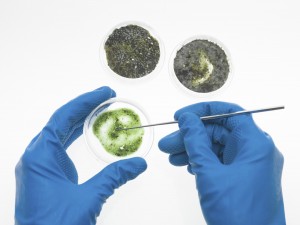The United States Department of Agriculture estimates that there are more than 300,000 of mold. From white to black, there are many different types of mold that can invade your home. But what are these fungi and how can they affect your home and your health?
Aspergillus
Aspergillus is both an indoor and outdoor mold that can cause many different health problems. The aspergillus mold family consists of more than 180 mold species and more than 22 of these species can cause illnesses in humans. Although most people breathe in this mold every day without showing any symptoms, others with weakened immune systems or with existing lung conditions can show signs of health problems due to aspergillus. Aspergillosis is a disease that is caused by this type of mold. There are several different types of aspergillosis ranging from mild to severe. For more information on these diseases, see our mold spotlight on aspergillus.
Stachybotrys
Stachybotrys molds tend to grow on high cellulose material like wood, hay, paper, and cardboard. Often called “black mold,” stachybotrys is highly toxic and can cause major health problems. This mold requires extremely wet and highly humid conditions for days or weeks to grow. Common symptoms for this mold can include a skin rash, inflammation and pain of the mucous membrane, burning sensation of the nasal passages, tightness of the chest, coughing, nose bleeds, fever, headaches, and fatigue. For more information on black mold stachybotrys, visit our black mold spotlight.
Cladosporium
There are currently more than 30 known species of cladosporium. Some common species include C. sphaerospermum, found in the air, soil, acrylic-painted walls, painted wood, mattress dust, in flooring, and in food stuffs; C. herbarium, the most prominent air-spora mold and can grow on just about any surface; and C. cladosporioides, a cosmopolitan species of mold that is isolated from meat, soil, air, and textiles. Cladosporium has been known to cause health problems like skin lesions, keratitis, nail fungi, and asthma.
Mucor
Mucor mold is often found along air conditioning systems and ductwork. It is fast-growing molds and is usually either white or gray in color. This mold has been known to cause zygomycosis, a rare infection caused by the Mucor.
Penicillin
Although penicillin is commonly thought of as being found on foods, it can also be found on walls and in soil. Penicillin is often found on food, grains, paint, carpet, wallpaper, fiberglass duct insulation, and on rotting vegetation. Penicillium infections commonly occur in individuals with immunosuppressed disorders. But this mold can also be extremely useful when it isn’t ruining your walls. Penicillin is used extensively in food processing. It is used to make cheeses, to improve the flavor of meats, and even in the medical field. Even though it is useful in both medical and food production, penicillin can cause health problems when people are exposed to it. Penicillin can cause hypersensitive pneumonitis, allergic alveolitis, and asthma.
Acremonium
Acremonium produces a potent mycotoxin, the toxins produced by many fungi. Acremonium’s mycotoxins can cause immune system, organs, and bone marrow damage as well as affects to your mental abilities. Acremonium is also a known carcinogen and releases a horrible smell and can make the inhabitants ill including nausea, vomiting, and even diarrhea.
There are many different types of mold that can grow inside your home but all of these molds are extremely dangerous and come with health problems. It is important to have mold removed as soon as possible. For more information on having a mold remediation in your home, call Environmental Consulting and Contracting Group today!
Contact Environmental Consulting and Contracting Group
If you or a family member suspects the presence of black mold or any other type of mold in your home, contact the professionals at Environmental Consulting and Contracting Group. With more than 30 years in the mold remediation industry, we have the experience and tools to help you. Contact us at 410-258-3579 or 1-877-591-MOLD (6653).
Be sure to follow us on Facebook, Twitter, and Pinterest!
Tags: Household Mold, Information, mold knowledge


